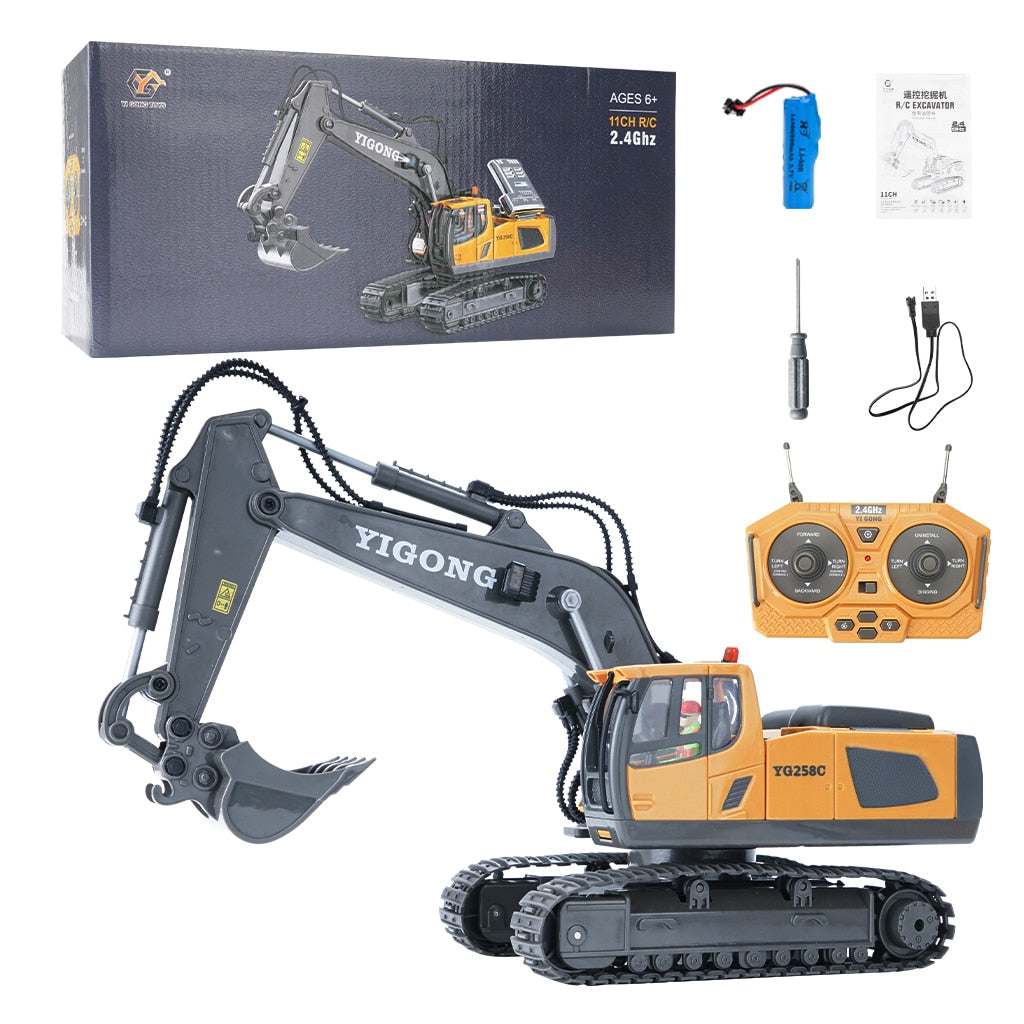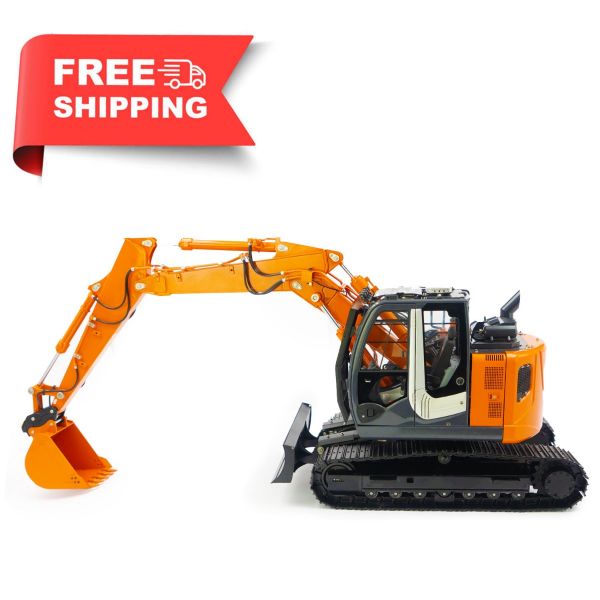Discover the Significance of Excavator in Modern Building Projects
Excavators are vital devices in modern building projects. Their convenience allows them to execute a vast array of tasks, from excavating and grading to demolition and website preparation. Advanced functions, such as hydraulic add-ons and general practitioners, boost their abilities and efficiency on work sites. As the market progresses, the relevance of excavators expands a lot more. Comprehending their role can expose understandings right into the future of building practices. What exists in advance for these makers?
The Convenience of Excavators in Various Projects
Although excavators are typically connected with large-scale construction tasks, their versatility enables them to be used in a variety of applications, from household landscaping to energy maintenance. In urban settings, excavators can navigate tight rooms to dig structures for homes or set up drain systems. Their capacity to perform delicate tasks makes them suitable for landscaping projects, where they can excavate for ponds or plant trees. Additionally, excavators play an important role in energy upkeep, effectively digging trenches for pipelines or cables without disrupting bordering locations. In agricultural applications, they assist in land cleaning and dirt prep work. Their versatility allows them to be geared up with numerous add-ons, enhancing their functionality throughout various tasks. This multifaceted nature of excavators not only simplifies various construction procedures but also demonstrates their indispensable role in modern facilities development and upkeep.
Secret Attributes and Sorts Of Excavators
The discussion on crucial attributes and types of excavators highlights the important features that make these machines invaluable in construction. Numerous excavator kinds, each designed for details tasks, show their adaptability and efficiency throughout different applications. rc excavator. Comprehending these attributes and classifications is crucial for optimizing their use in contemporary building and construction tasks
Excavator Enters Overview
Excavators play a crucial duty in modern-day construction, using flexibility and effectiveness across numerous tasks. These heavy machinery devices been available in a number of kinds, each tailored for particular applications. One of the most typical kinds include spider excavators, understood for their stability on uneven surface, and wheeled excavators, which supply better mobility on paved surface areas. Miniature excavators are preferred for limited areas and small-scale tasks, while long-reach excavators are created for deep excavating. In addition, there are specific excavators, such as hydraulic excavators, which enhance power and precision. Each type features unique capabilities, making them necessary for jobs varying from excavating and grading to demolition and product handling. Recognizing these variants permits building professionals to choose the appropriate excavator for their job requires.
Trick Features Explained
Understanding the key features of excavators boosts their efficient application in construction tasks. Excavators are identified by their effective hydraulic systems, which supply the essential force for digging, lifting, and moving materials. Their verbalized arms enable a vast array of movement, facilitating specific procedures in confined rooms. Additionally, the selection of attachments, such as pails, grapples, and augers, increases their versatility to satisfy various task needs. The dimension and weight of excavators likewise add to their stability and ability to move on different surfaces. Improvements in technology have actually led to the assimilation of GPS and automation, improving accuracy and performance in excavation jobs. These functions collectively place excavators as important tools in modern building.
Applications in Building and construction
Transforming building and construction websites, excavators play a pivotal duty across numerous applications, varying from household building tasks to large facilities developments. These flexible devices are outfitted for jobs such as digging structures, trenching for utilities, and site grading. Different sorts of excavators, including spider, wheeled, and mini excavators, supply specific benefits tailored to the task requirements. Spider excavators succeed in rough surfaces, while wheeled excavators supply wheelchair on paved surface areas. Miniature excavators are suitable for confined areas, making them popular in metropolitan settings. The effectiveness and power of excavators significantly speed up building procedures, guaranteeing prompt project completion. Their versatility better enhances their significance, permitting building groups to deal with a diverse selection of challenges properly.
Enhancing Effectiveness and Efficiency on Job Sites
Taking full advantage of effectiveness and performance on work sites is a crucial purpose in contemporary building and construction. Excavators play an essential role in attaining this objective by enhancing various tasks. Their capacity to carry out numerous features-- such as excavating, grading, and lifting-- decreases the need for added devices, thereby conserving time and resources.Moreover, excavators enhance process by permitting faster completion of projects. With innovative functions like hydraulic accessories and general practitioners technology, they can carry out exact procedures that decrease errors and remodel. This precision not only boosts the quality of work but also enhances material use, adding to cost savings.The convenience of excavators enables them to adjust to various site conditions, guaranteeing that jobs advance smoothly no matter difficulties. By incorporating excavators into building and construction processes, teams can substantially boost their overall performance, bring about prompt job additional hints completion and raised productivity.
Security Advantages of Using Excavators
Excavators substantially boost safety on construction sites through improved driver visibility and decreased hand-operated labor threats. By giving operators with a clear view of their environments, excavators help to avoid mishaps and injuries. Additionally, the machinery minimizes the need for workers to involve in dangerous hand-operated tasks, further promoting a more secure work setting.
Boosted Driver Visibility
Building sites can be chaotic and filled up with prospective risks, improved operator visibility plays a necessary function in guaranteeing safety and security when utilizing excavators. Modern excavators are developed with huge, unblocked windows and purposefully positioned mirrors, enabling drivers to maintain a clear sight of their surroundings (rc excavator). This boosted visibility is essential look what i found for identifying pedestrians, other machinery, and different challenges, substantially decreasing the risk of mishaps. Furthermore, several excavators include advanced innovation, such as sensing units and electronic cameras, to supply operators with extra point of views, additionally boosting understanding. The capability to see more clearly not just help in effective operation however likewise fosters a much safer workplace, making it easier for operators to navigate complicated building sites without endangering security criteria
Reduced Guidebook Labor Risks
When manual labor is minimized through the use of excavators, countless safety and security benefits arise, substantially enhancing the health of building workers. Excavators minimize the physical strain connected with heavy training and repetitive jobs, effectively decreasing the danger of bone and joint injuries. By automating procedures such as digging, grading, and moving materials, they enable workers to keep a safer range from possible threats. Additionally, excavators are outfitted with advanced safety and security attributes, such as rollover defense systems and boosted operator functional designs, which better guard employees on website. The result is a significant reduction in workplace accidents and injuries, bring about boosted performance and spirits amongst building and construction teams. Inevitably, the fostering of excavators contributes to a safer and a lot more effective building and construction environment.
Excavators in Earthmoving and Site Preparation
In modern-day building and construction, a considerable section of earthmoving and site prep work jobs relies on the effectiveness and adaptability of excavators. These machines are designed to handle different soil types and terrain, making them vital for grading, digging, and trenching tasks. Their hydraulic arms can be equipped with different accessories, such as buckets and augers, permitting operators to tailor their technique based upon certain job requirements.Excavators excel at relocating large quantities of planet swiftly and effectively, which accelerates the general construction timeline. They can navigate tight spaces and challenging websites where traditional tools may struggle, boosting efficiency. Furthermore, the precision of excavators assurances that site preparation follows rigorous specifications, decreasing the risk of errors that might lead to costly rework.
The Function of Excavators in Demolition Tasks
Excavators play a necessary function in demolition tasks, as they have the power and dexterity required to take apart frameworks effectively. Outfitted with various add-ons such as hydraulic breakers, shears, and grapples, these equipments can adjust to various demolition demands, whether for little structures or huge commercial websites. Their flexibility makes it possible for drivers to take on complex tasks while maintaining safety and precision.In addition to their demolition capabilities, excavators promote debris removal, ensuring that job websites continue to be secure and well organized. By breaking down structures right into workable items, they enable streamlined clearing up and recycling of products, lining up with contemporary sustainability efforts.Moreover, excavators can access limited rooms and browse unequal surface, making them important in urban demolition projects. Overall, their durable design and multifunctionality make excavators an important property in the demolition stage of construction, contributing significantly to task timelines and performance.


Future Trends in Excavator Innovation and Use
As the construction industry progresses, innovations in excavator technology are poised to transform their usage and effectiveness significantly. One considerable fad is the combination of automation and expert system, enabling excavators to operate with very little human treatment. This change will enhance accuracy in tasks such as grading and trenching, minimizing human mistake and enhancing productivity.Additionally, the surge of hybrid and electrical excavators is shaping an extra lasting construction setting, reducing carbon exhausts and gas expenses. Boosted telematics systems are likewise emerging, making it possible for real-time monitoring of maker performance and upkeep requirements, which can bring about better operational performance and longer tools lifespan.Moreover, advancements in accessory modern technology are expanding the flexibility of excavators, allowing them to execute a broader variety of tasks. The combination of these patterns demonstrates a future where excavators are smarter, greener, and more versatile, inevitably reshaping construction project characteristics.
Regularly Asked Inquiries
Just How Do Excavators Contrast to Various Other Building And Construction Equipment?
Excavators, defined by their versatility and power, master excavating and earthmoving compared to other equipment. Their ability to perform various jobs, including lifting and demolition, makes them crucial in building and construction jobs, improving total performance.

What Is the Typical Life Expectancy of an Excavator?
The ordinary life expectancy of an excavator normally ranges from 7,000 to 10,000 operating hours, depending on upkeep, use problems, and version. Proper treatment can prolong this life-span, making sure peak performance throughout its functional years.
Just How Are Excavators Maintained for Optimum Performance?
Excavators call for regular upkeep for peak efficiency, including routine evaluations, liquid checks, filter substitutes, and prompt repairs. Carrying out a precautionary upkeep schedule helps extend their life expectancy and guarantees reliable procedure in numerous construction environments.
What Are the Expenses Linked With Acquiring an excavator vs. renting?
The prices connected with renting out versus acquiring an excavator vary considerably. Renting out deals lower upfront expenditures however can build up gradually, while buying requires a significant first investment, yet gives long-lasting cost savings and asset possession advantages.
What Training Is Called For to Operate an Excavator?
Operating an excavator requires specialized training, typically including safety protocols, equipment procedure techniques, and environmental recognition. Qualification programs frequently mandate useful experience, allowing drivers to manage numerous jobs successfully while making sure conformity with market guidelines. The most typical types consist of spider excavators, recognized for their security on unequal surface, and wheeled excavators, which provide higher mobility on paved surfaces. Tiny excavators are favored for small tasks and limited rooms, while long-reach excavators are created for deep excavating. In addition, there are you could try these out specialized excavators, such as hydraulic excavators, which enhance power and accuracy. Various types of excavators, including spider, rolled, and mini excavators, give certain advantages tailored to the project needs. Spider excavators succeed in rough surfaces, while rolled excavators use wheelchair on paved surfaces.